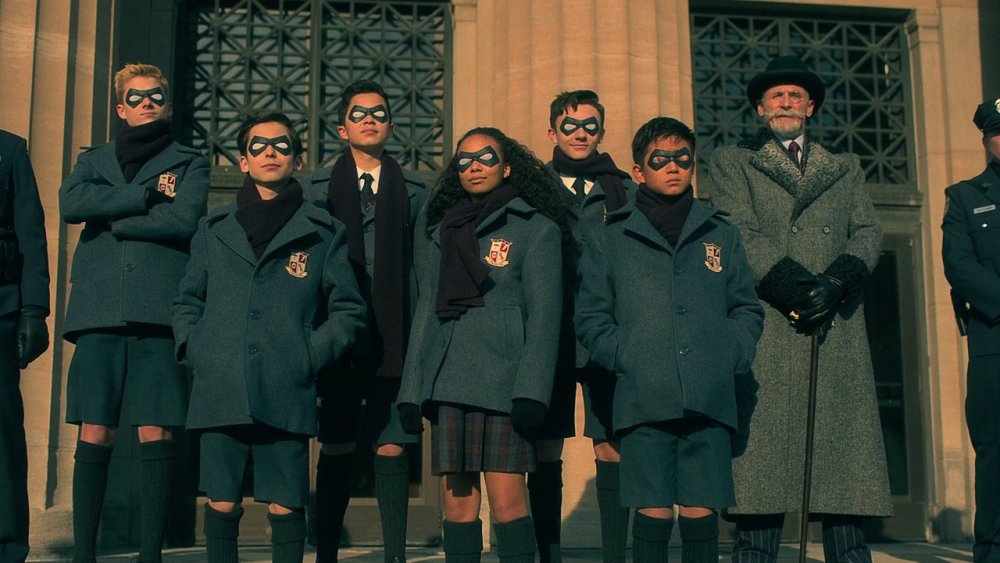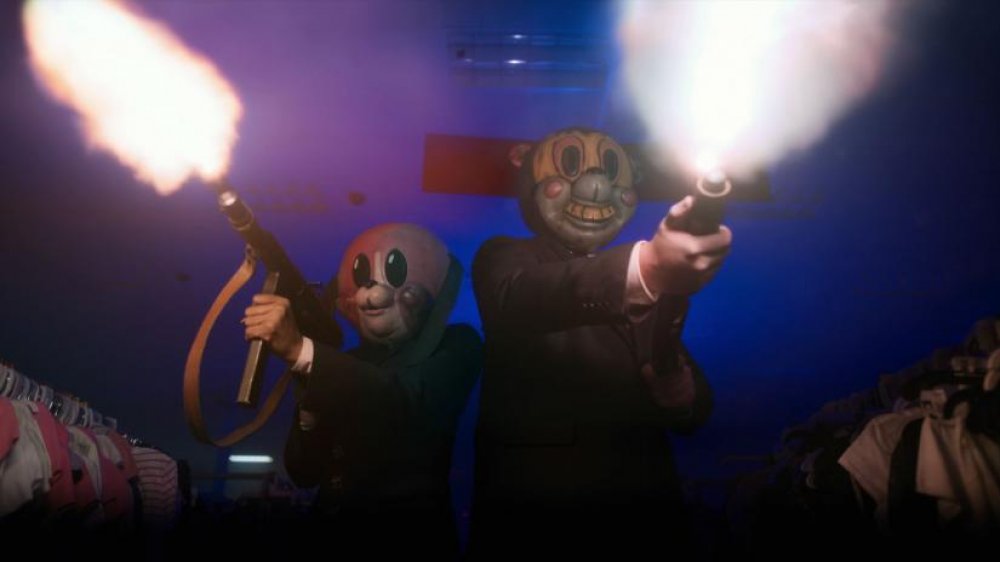The Biggest Ways Netflix's Umbrella Academy Differs From The Comic
Though The Umbrella Academy premiered in typical Netflix fashion to little fanfare in February 2019, the stylish, hyper-violent superhero series quickly found its footing in the increasingly crowded content landscape to become an unexpected hit for the streamer. The series — centered around a group of adopted, super-powered children bound together as a crime-fighting team by a billionaire mad scientist — became such a hit that Netflix quickly ordered a second season of The Umbrella Academy, currently eyeing a 2020 release date.
Given where the first season of the series left off, it's clear that major changes are on the way for the Hargreeves kids on the upcoming season of The Umbrella Academy. However, fans of the comic book series that inspired the hit Netflix show would probably be quick to tell you that "major changes" were very much the modus operandi for the entire first season. While Netflix's adaptation of The Umbrella Academy remained relatively faithful to the award-winning source material from Gerard Way and Gabriel Bá, there were some pretty stark differences between page and screen throughout that first season.
Spoilers are ahead!
One of the biggest narrative arcs throughout the first season of The Umbrella Academy was the transformation of the thought-to-be-powerless Vanya (Ellen Page) into a full-blown villain with seemingly unstoppable abilities. Directly tied to Vanya's rapidly depleting emotional state, those abilities ultimately lead to the apocalyptic event that leaves the world in ruins. The season 1 finale found the remaining adult Hargreeves desperately banding together in hopes of stopping Vanya and avoiding mankind's end days.
In Way and Bá's original six-book series The Umbrella Academy: Apocalypse Suite, the Hargreeves kids are successful in that endeavor — with Number 5 utilizing his renowned skill as a marksmen to put a bullet in Vanya's head (leaving her paralyzed and amnesiac, but alive), and Klaus using his rapidly developing telekinetic abilities to prevent a band of inbound meteors from laying waste to Planet Earth, thus saving mankind from certain doom.
That isn't even close to what happens on the final episode of The Umbrella Academy season 1. In a wildly dramatic shift from the books, the season 1 finale saw the Hargreeves (after following an absurdly bad plan from their Number 1 Luther) failing entirely in their world-saving endeavor, and Vanya's unchecked power bringing on end times as the Hargreeves use Number 5's time-traveling abilities to escape to an unknown point in the past. They do escape, but the ensuing apocalypse is still presumably a part of their future, and that fact will need to be addressed on the coming season.
As volume 2 of Way and Bá's source material picks up a separate storyline, the stark narrative shift will obviously force The Umbrella Academy showrunner Jeremy Slater to take a different approach to the Hargreeves' post-Apocalypse Suite story. However that story unfolds, the uncertainty surrounding the series' second season has already raised a few eyebrows among fans of the source material — with many wondering not just why the decision was made, but also what other changes lay ahead for the characters they've come to know and love on the pages of Way and Bá's books.
What else did Netflix change in The Umbrella Academy?
While we wait to see what Slater and The Umbrella Academy's creative team have on tap for the second season of the series, we should mention that the finale switcheroo wasn't the only major difference from the comics to the show. As it happens, the initial run of books that inspired The Umbrella Academy didn't even feature two of the major players on season 1 of the Netflix series: the creepily masked, time-traveling assassins Hazel (Cameron Britton) and Cha-Cha (Mary J. Blige).
The pair were such a large part of the season 1 narrative that it's all but impossible to imagine them not being equally important in the Umbrella Academy comics. But in spite of that fact, neither Hazel nor Cha-Cha were featured in any part of The Apocalypse Suite storyline. The infinitely quippy duo didn't turn up until the first edition of the second run of The Umbrella Academy books, and played a major role in the Dallas storyline collected therein. They were still dispatched to "correct" the actions of Number 5, but the deadly duo were nowhere near as friendly with each other in the comics.
Additionally, there was no love story between Hazel and Agnes, the Griddy's Doughnuts baker and waitress, in those original books. Nor was there any incessant bemoaning of the bureaucracy within The Commission, with both characters ultimately meeting grisly deaths in that six-book Dallas arc. As Hazel cleverly found a way for himself and Agnes to escape the apocalypse on the season 1 finale, it's a safe bet we'll see more of that duo on the upcoming season of The Umbrella Academy. Cha-Cha's fate, however, is still very much up in the air.
It's worth noting here that the Dallas storyline deals heavily with Number 5's involvement in the assassination of John F. Kennedy. It just so happens this is yet another point of deviation between the series and the comics: Number 5 does the deed himself in Way and Bá's books, while his role is far less certain on the Netflix show. Also, did we mention that Number 5's Commission handler (played by Kate Walsh on the Umbrella Academy series) is actually a genius-level goldfish in the books? Yes, that's true. And yes, it's just part of what makes Way and Bá's books far stranger than anything we've seen on the Netflix series so far.
Truth be told, there are many other, slightly less dramatic differences we could delve into here. Stuff like Allison (played by Emmy Raver-Lampman on the Netflix show) not becoming a famous actress in the books, and Diego (David Castañeda) not being a power hungry mama's boy out to avenge the death of a lover. Or even the apparent fact that none of the other 43 infants born to highly irregular circumstances developed super powers on the series. Frankly, such major narrative alterations are enough to make one wonder how much of the source material will remain in tact for season 2 of The Umbrella Academy.
Still, it's clear most of the bigger changes were made in the service of keeping The Umbrella Academy a bit more grounded in reality, and therefore more accessible to viewers. That's all well and good, but we're sincerely hoping things get a little weirder — and thus more faithful to the comics — on the new season of The Umbrella Academy.

